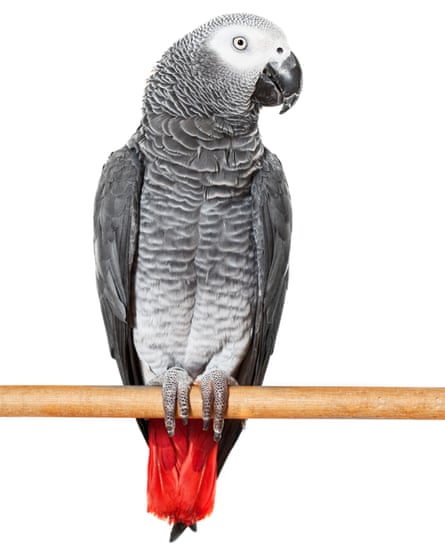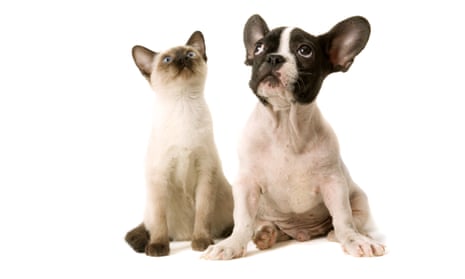Troy Vettese has a parrot in his family. She gets paid a lot of attention, but she wants more. Parrots are clever and social. Vettese says: “She needs to be entertained all the time, otherwise she really is suffering.” He sees a possible different life for her: “She could be living with her friends and family in a forest, very happy – but she’s not, and that’s unfair to her.”
If that sounds sensible, but you don’t see what it has to do with the fluffy, well-exercised and frequently fed love of your life at home, bear with me. Of course, when it comes to owning pets, there are varying shades of grey. On one end of the spectrum: the poor snake I spotted at a party recently, being worn as a necklace. At the other might be your rescue pup, or my rescue cats, one with a damaged cerebellum and the other with one eye; they wouldn’t have survived long on the streets. But I still find myself wondering whether it is fair keeping them at all.
We may think that we are giving our companions rounded lives and putting them first when we rise early for walkies or clean up another accident. But Vettese, an environmental historian who specialises in animal studies, says the suffering of his family’s much-loved bird is evidence that pet ownership is not about the animals.
“If people really cared about animals, we would only engage in rescues and helping animal sanctuaries’ wildlife rehabilitation – things that we find fulfilling, but that also help the animal,” he says. Instead, “we only like relationships where they are easy, where the pets are well maintained, where we can hire a dog walker, where it impinges as little as possible on our life and we are extracting as much emotional support as we want from them”. To his mind, it is definitely “a very selfish relationship”.
Trends in pet ownership could be taken as evidence of this: 24% of all owners in the UK got their pet in the past two years, with a total of 5.4m pets acquired since 2020, according to a recent report by the People’s Dispensary for Sick Animals. During Covid lockdowns, people were bored at home, allowed out only to take walks – on which a dog provided company. In the immediate aftermath, as people went back to work and realised a musclebound American bully XL dog wasn’t going to love being alone in a flat all day, lots of animal shelters were overrun; many continue to be, as a consequence of the cost of living crisis.

But, at least in the “traditional west”, keeping animals such as dogs and cats seems to be the norm, says Jessica du Toit, a doctoral student in philosophy at Western University in Ontario who studies animal ethics. She grew up with pets and takes every chance she can to spend time with her parents’ elderly dog, Oliver. In fact, she says, “so many people nowadays consider these animals to be their companions, or a part of their respective families, that we have things such as Uber Pet [which allows you to order a taxi that will take you and your four-legged friend]; restaurants, hotels and workplaces stating that they are pet-friendly; and people earning good incomes as pet walkers, pet sitters and pet psychologists”.
Jessica Pierce, a bioethicist and the author of Run, Spot, Run: The Ethics of Keeping Pets, says: “We’re at a really weird place, and definitely a place that is unlike any we’ve been in the past.” She cites a new report on the pet industry in the US that puts the figure of US households with pets at 70%: “That’s unbelievable!”
It isn’t just the scale of pet ownership that has mushroomed in recent years, Pierce says, but also what she describes as the “intensity” of pet ownership: “They are much more intensively captive than they have been in the past.” She takes the example of dogs, which, in general, “have less and less freedom to move around the world and be dogs”.
The way we breed animals now – for traits that we find cute, docile or hypoallergenic – is at dizzying new heights. “Dogs and cats are more and more treated like objects, products, a substrate, not like beings,” says Pierce, who grew up with dogs, cats and “a bunch of other pets”. It was when history repeated itself and her young daughter had her own menagerie that she “started to really look at the ethics of it”. She points to breeds such as “pugs and boxers, which have lifelong quality-of-life compromises”.
Then there are the ways they are much more intensely “ours” than once they might have been – another member of the family in a way that is loving, but not very animal. Our pets have become like our children. We buy them bow ties for their birthday and take them for tea-tree oil pawdicures. Professionals paint portraits of them to hang on our walls, or we do it ourselves; I spent a particularly silly afternoon creating lino likenesses of my cats.
The global pet industry is vast – worth $320bn, according to one report – and increasingly humanised; products cash in on our desire to spoil animals and shower them with a very human, consumerist kind of love. The psychology is complicated, and pet owners might feel they are indulging their animals, but how much is that high-concept toy really about your hamster?
“The level of emotional dependence humans have on their companion animals is different from any time in the past,” says Pierce. “People are seeing dogs as emotional aids, whether or not they are officially therapy animals.” This is, she thinks, taking its toll. If you look at veterinary literature, she says, the levels of “acute anxiety in dogs are off the charts”.
We are asking animals to fill a very human need, says Vettese: “People are looking for unconditional love.” But that love “is predicated on this absolute domination of the pet’s life – what they eat, their sexuality, their love, their activity – and you can’t disentangle these two things”. If pets had more autonomy, he says, “they would not necessarily have this unconditional love”.
For pet owners, this is an uncomfortable concept. Would my cats still nuzzle me with wild abandon if I weren’t such a reliable cat-treat dispenser? I shudder at the thought.
“The problem with unconditional love,” says Ed Winters, the author of This Is Vegan Propaganda (And Other Lies the Meat Industry Tells You), is that it comes at a price. “How are they going to feel when we go into the shop and they’re whining at the door? They’ve become so reliant on us that even just a few hours of separation can cause distress.” He has only ever had one pet – a hamster called Rupert whose personality was so winning that he was a catalyst for Winters to become vegan.
Even if our pets aren’t depressed, perhaps they aren’t living their best lives. “There are certainly some animals who do very well in the care of certain human beings,” says Du Toit. “But many human beings, even when they are kind and conscientious custodians of their animals, underestimate the needs and desires of their companions.” Even if you have the basics covered, “most dogs and cats also need adequate cognitive stimulation, and opportunities for play and socialisation with compatible conspecifics [animals of the same species] if they are to have minimally decent lives.” Without it, she says, they experience frustration, loneliness and sometimes separation anxiety.

“The boredom of animals is intense,” says Vettese. He looks to parrots again – two in five African grey parrots exhibit “feather-damaging behaviour”, or plucking themselves, out of boredom. Fish are increasingly thought to be bored or stressed by tank life. My cats have a garden and toys in the shape of mackerel to play with, but I would hazard that they would cause a lot less “mischief” if I had more time to better occupy them with feline-oriented games.
Regarding uncaged domesticated animals, Pierce still says that “captivity is the main ethical problem … because even dogs and cats are captive in important ways and captivity has a whole range of physiological and neurological ill effects on animal brains and bodies”. Cats are often free to come and go as they please – mine frequently do, coming back smelling of woodsmoke and another person’s perfume – but, when push comes to shove, they are captive broadly to my will. That said, Pierce argues that “agency and a really broad sense of control over their own lives” counteracts at least some of the negativity of captivity for dogs and cats.
There are other ethical acrobatics involved in pet ownership. Take the damage pets do to other animals and habitats. Cats, for instance, kill a huge amount of wildlife and have contributed to the extinction of 63 species worldwide. Then there is their carbon footprint. While we are increasingly aware of how our diets affect the planet, Winters argues that we view our pets separately; I can’t be the only pescatarian who feeds their cat meat. It might not always be thus – according to the largest study to date, vegan diets are healthier and safer for dogs than conventional meat-based diets, as long as they are nutritionally complete. But if US pets were a country, they would rank fifth globally for meat consumption, ahead of Germany.
So, is there a way to own pets ethically? Yes and no, Pierce says. “There’s no such thing as perfect … but we can do our best and do pretty well.” She has a dog called Bella – “a mix of some sort … she’s super-cute” – who has some physical disabilities, “so she can’t walk very well, but she has a lot of fun in life”. They take her hiking in a backpack. Taking care of her is, she says, a big responsibility; Pierce feels constantly as though she is not doing enough for her. Whereas previously she thought Bella had behavioural issues, she now sees that it is her job to adapt more thoughtfully to her needs “and not make her do all the work”.
It would be good, says Pierce, “to see us doing more work to adapt ourselves to our dogs”. Take our homes: it should be obvious, she thinks, when we enter the house of someone who has dogs or cats. “Let it be a house full of dog, with beds that smell like the dog, because that’s going to be comfortable for the dog. Toys lying around, hair on the couch, muddy footprints.”
Adopting animals from shelters rather than buying them from breeders is one obvious step, but perhaps we need to reframe our relationship with pets altogether. “We understand that they have emotions and thoughts, because that’s one of the ways that we find them wonderful companions,” says Pierce. “But at the same time, we fail to see them for who they are. We see them for who we think they are, who we want them to be.” I can’t honestly deny the joy of seeing a yorkshire terrier dressed as Wonder Woman, but I am pretty sure it’s not a dog’s idea of a good time.
Du Toit makes a distinction between owning pets and keeping them. The former, she argues, may “foster or reinforce problematic attitudes towards the animals we keep as companions … we are very unlikely to think of ourselves as having onerous moral duties to that which is our property”. By shifting our thinking and language to “‘caring for’ or ‘keeping’ companion animals” says Du Toit, “we are much more likely to treat our companion animals in a manner that is appropriate, given their inherent moral worth”.
